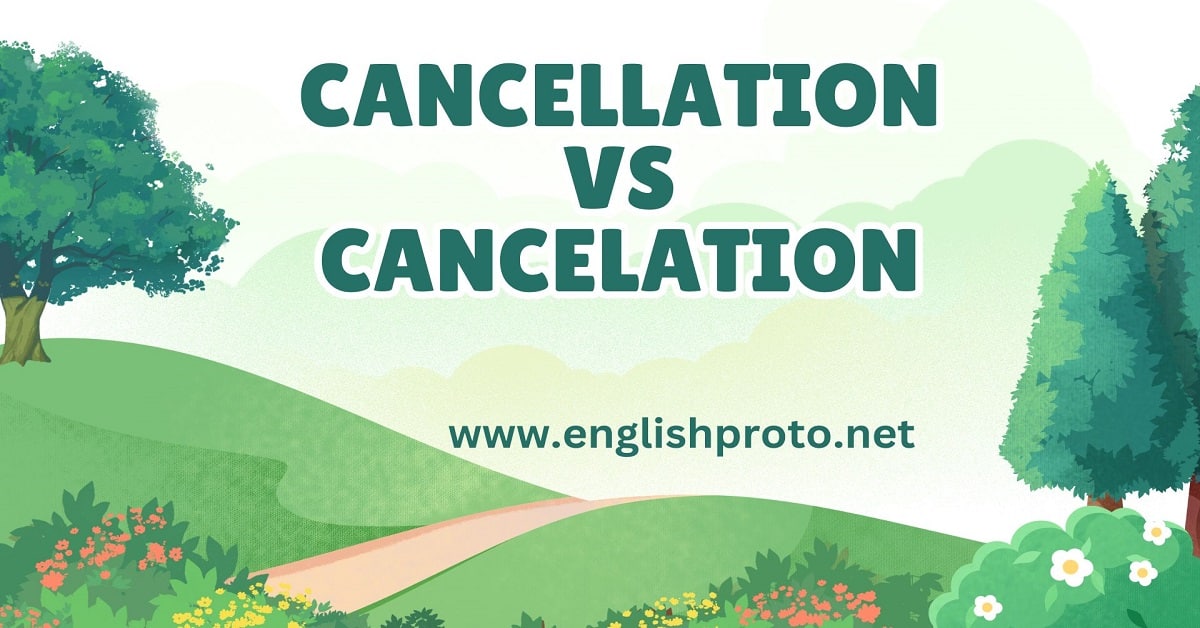Cancellation vs Cancelation, have you ever paused to wonder which one’s correct? You’re not alone. These two spellings often leave even the most seasoned writers second-guessing.
Whether you’re drafting an important email or perfecting your resume, choosing the right form can make all the difference in how polished and professional you come across.
But don’t worry you’re in the right place to settle the debate once and for all! In this article, we’ll untangle the confusion, explain why both versions exist, and show you how to use them correctly. Ready to boost your confidence in writing? Let’s dive in!
Quick Summary
Cancellation (double “l”) is the preferred spelling in British English and is widely accepted in American English. Cancelation (single “l”) is an alternative spelling sometimes used in American English but is much less common.
Both forms mean the act of calling off or nullifying something, but cancellation is overwhelmingly favored in professional and academic writing.
Key Takeaways:
- Cancellation is standard in British and American English.
- Cancelation exists but is rarely used and may appear outdated or incorrect.
- Consistency in spelling enhances clarity and professionalism.
Reasons for Confusion about Cancellation vs Cancelation
Several factors contribute to the mix-up between cancellation and cancelation:
- Regional Differences: British English often doubles the “l” in words like “travelling” or “cancelling,” while American English sometimes simplifies it.
- Pronunciation Similarity: Both forms are pronounced almost identically, making the visual distinction less apparent.
- Historical Usage: Older American dictionaries included cancelation, though it has since fallen out of favor.
- Autocorrect and Spell Check: Modern software may not flag cancelation as incorrect, perpetuating its usage.
Detailed Explanation about Cancellation vs Cancelation
Correct Usage
The word cancellation is derived from the verb cancel and follows standard English spelling rules. When forming the noun, the final consonant is doubled before adding the suffix -ation because the stress is on the last syllable of “cancel.” This doubling rule applies in both British and American English, making cancellation the accepted form in most cases.
When to Use “Cancellation”:
- Formal Writing: Business reports, academic papers, and legal documents.
- Everyday Writing: Emails, social media posts, and casual correspondence.
- Consistent Communication: To align with widely recognized standards.
Is “Cancelation” Ever Correct?
While technically valid in American English, cancelation is considered a less common and less polished alternative. Using cancellation avoids potential confusion and maintains professional integrity.
Importance of Correct Usage
Choosing the correct spelling impacts:
- Credibility: Incorrect spelling can undermine your authority as a writer.
- Clarity: Consistent usage ensures your message is easily understood.
- Professionalism: Adhering to widely accepted norms reflects attention to detail and respect for language standards.
Common Errors
- Using “Cancelation” in Formal Texts:
- Example: “The cancelation of the event was announced yesterday.”
- Correction: “The cancellation of the event was announced yesterday.”
- Mixing Spelling in the Same Document:
- Example: “The cancellation process started after the cancelation notice was issued.”
- Correction: Maintain consistency by using “cancellation” throughout.
- Overgeneralizing Rules: Assuming that simplified American spellings like “cancelation” are acceptable in all contexts, which can lead to inconsistencies.
Synonyms or Alternatives
If you’re unsure which form to use, consider these alternatives:
- Calling off
- Annulment
- Termination
- Discontinuation
- Postponement (if the event is rescheduled rather than canceled)
These options can fit various contexts and reduce the risk of spelling errors.
Examples in Sentences
Here are examples showcasing proper usage:
- “The airline announced the cancellation of several flights due to bad weather.”
- “We regret to inform you about the cancellation of your subscription.”
- “The contract included a clause for the cancellation of services in case of non-payment.”
Incorrect:
- “The airline announced the cancelation of several flights due to bad weather.”
- “The cancelation process took longer than expected.”
Quick Tip: Always default to “cancellation” to align with the most widely accepted usage.
Origins and History
The word cancellation stems from the Latin root “cancellare,” meaning to cross out or make invalid. Over time, English adopted this term to signify nullifying agreements or events.
The single “l” form, cancelation, emerged as a simplified spelling in some American texts during the 19th and early 20th centuries. However, it never gained widespread acceptance and has largely faded from use.
Regional Variations in English
The spelling difference reflects broader tendencies in British and American English. For example:
| British English | American English |
| Travelling | Traveling |
| Colour | Color |
| Programme | Program |
| Cancellation | Cancellation/Cancelation |
While American English often simplifies spellings, cancellation remains dominant in both regions.
Practical Application
Tips for Writers
- Choose a Style Guide: If you’re writing for a specific audience, follow their preferred style guide (e.g., APA, MLA, or Chicago Manual of Style). Most will favor “cancellation.”
- Consistency Matters: Stick to one spelling throughout your document to maintain professionalism.
- Use Tools Wisely: Rely on reputable dictionaries and style resources rather than autocorrect to confirm correct spelling.
For Students and Professionals
- Students: Use “cancellation” in essays, theses, and academic work to ensure correctness and earn credibility.
- Professionals: Use “cancellation” in emails, reports, and presentations to communicate effectively and professionally.
Examples in Different Contexts about Cancellation vs Cancelation
- Travel: “Due to unforeseen circumstances, the airline announced the cancellation of all flights.”
- Education: “The cancellation of the lecture was communicated via email.”
- Finance: “A cancellation fee will apply if you terminate your subscription early.”
- Events: “The storm led to the cancellation of the outdoor concert.”
Conclusion
Understanding the difference between cancellation and cancelation is more than a matter of spelling. It reflects your attention to detail and commitment to clear communication.
By consistently using cancellation, you align with widely recognized standards and avoid potential misunderstandings. In professional and everyday contexts, opting for the correct form ensures your writing remains polished and effective.
Always aim for consistency and clarity, ensuring your work resonates with a broad audience and meets the highest standards of language proficiency.



